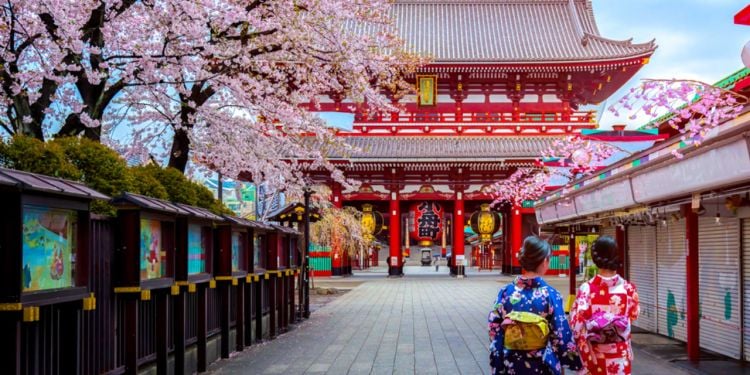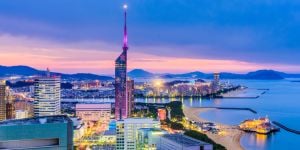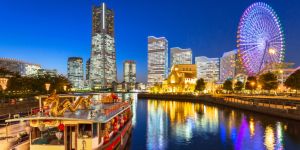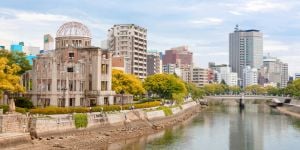
If you want to travel around Asia as a digital nomad, Japan should be at the top because it differs from its neighboring countries. Many people think Japan is very expensive, but that's not the case if you're not planning to move here permanently. Whether you prefer the bustling city life of Tokyo or a more peaceful experience in rural areas, let's explore what every digital nomad should know about Japan.
Japan – an ideal destination for digital nomads
Japan is known for its low crime rate, rich cultural heritage, famous tourist attractions, delicious food, and vibrant pop culture. Japan is becoming increasingly popular among digital nomads looking for a great place to work remotely. Compared to many Western countries, Japan's living costs are affordable. The weakening of the Japanese yen since 2022 has made spending time in Japan even more appealing.
Some of the things that most remote workers and digital nomads are after are high-speed Internet and access to the latest technology to enable efficient communication. Japan is the mecca for new tech: from attending exhibitions to participating in startup meet-ups, here you will be able to stay up-to-date with the latest trends in electronics, telecommunications, digital advances, and more.
Another factor that attracts travelers and working nomads to Japan is that this Asian country offers top-notch living standards, great food, and convenient infrastructure on par with European countries. However, Japan is strikingly different from the rest of the world, and its amicable quirkiness allows its guests to expand their horizons every day.
Digital nomad visa in Japan
Is there a digital nomad visa in Japan?
Introduced in March 2024, the Japan digital nomad visa allows you to stay for up to six months, with no extension possible. This visa caters to individuals who wish to work remotely in Japan for a period not exceeding six months, as well as to spouses or children accompanying these individuals for the same duration.
To determine if you are from an eligible country or region, you should visit the Immigration Services Agency website for detailed information. This step is crucial, as it ensures you meet the basic eligibility criteria before proceeding with the application.
The application process requires several key documents. Firstly, you will need to complete a visa application form, including a recent photo. Ensure your passport is valid for the entire duration of your stay. If you have a Certificate of Eligibility (COE), many subsequent documents can be omitted. However, if you do not have a COE, you must provide documentation explaining your planned activities and period of stay in Japan, using the designated form provided by the Immigration Services Agency.
A critical requirement is proof of an annual income of JPY 10 million or more. Acceptable documents for this purpose include tax payment certificates, income certificates, employment contracts, or contracts with business partners that clearly state the contract period and amount. Additionally, you must demonstrate that you have insurance coverage against death, injury, or illness during your stay in Japan. This insurance must provide compensation for medical treatment amounting to JPY 10 million or more. You will need to provide a copy of the insurance certificate, policy summary, a copy of your credit card (if it offers supplementary compensation), and documents proving the scope of insurance coverage.
If you are applying as the spouse or child of a digital nomad, you will need similar documentation. This includes completing a visa application form with a photo and ensuring your passport is valid. If you possess a COE, certain documents can be omitted. However, without a COE, you must provide documentation explaining your planned activities and period of stay, using the designated form. Proof of insurance coverage is also required, with the same conditions as for the digital nomad.
Additionally, you must provide documents proving your relationship with the digital nomad visa holder, such as marriage or birth certificates. A copy of the passport of the digital nomad visa holder must also be included. If family coverage is provided by the insurance of the spouse or parent, include a copy of the documents confirming the scope of coverage.
The Certificate of Eligibility (COE) is a crucial document that can facilitate the visa application process. Issued by a regional immigration bureau, the COE helps streamline the visa application at the Embassy or Consulate-General and the landing examination at passport control. However, possessing a COE does not guarantee the issuance of a visa. For more details, please visit the Japanese Ministry of Foreign Affairs website.
A recent study from MBO stated that digital nomads have become more common in society in a short period. In the US, approximately 11% of workers now identify as digital nomads. Furthermore, it is predicted that the global population of digital nomads will surpass 40 million this year and reach around 60 million by 2030.
Other visa options in Japan for foreign remote workers
There are other visa options available that you can consider, including the tourist visa, WHV, work visa, start-up visa, and business management visa. The most convenient visa to acquire is a tourist visa, granting you a delightful stay of up to 90 days.
It is acceptable if you are in Japan for sightseeing and tourism and working remotely for a foreign company. However, teleworking for a Japanese company on a tourist visa would breach Japan's visa regulations.
Adherence to Japanese tax regulations as a digital nomad
Depending on your visa type, knowing about Japanese tax laws is essential if you plan on working in Japan. Generally, income tax in Japan is calculated based on your income, and Japanese citizens are taxed on their net taxable income at different rates, ranging from 5.105% to 45.945%. They also have to pay a local inhabitant tax of 10%. However, non-residents who stay in Japan for less than one year, such as those holding a Working Holiday Visa, have a tax rate of 20.42%.
In certain situations, you may also be required to pay taxes in your home country, which can result in double taxation. It is advisable to seek guidance from a tax professional specializing in international taxation to help you navigate both Japanese tax laws and the tax requirements of your home country.
The Internet, coworking spaces, and networking in Japan
The average download speed in Japan is around 18.2 Mbps, and most cities are equipped with high-speed fiber internet. Japan has an even better performance in store, one of the countries working on the unbeatably fast 100 Gbps.
Not long ago, coworking spaces were almost non-existent in the country. However, as it often is in Asia, once the shared office trend appeared, it grew exponentially. Today, you should not have trouble finding a desk in a shared office in any big city.
In addition, working in Japan gives you the incredible opportunity to connect and form relationships with people worldwide. Not only can you find office spaces in various Japanese cities, but you can also participate in networking events specifically designed to foster a sense of community within the coworking spaces.
There are numerous networking events throughout Japan that you can quickly discover through platforms like Meetup.com, Eventbrite, and DoorKeeper. These resources allow you to expand your network and create lasting connections.
Best cities for remote working in Japan
Japan offers many places catering to various preferences and work styles, from the bustling metropolises with modern conveniences to the charming towns steeped in centuries-old traditions.
So, if you're about to embark on this exciting journey, let's explore some of Japan's best places to work and enjoy life.
Tokyo
Tokyo is the capital of Japan and the best place to start exploring the country. Get ready for some hustle and bustle: Tokyo is one of the most populated cities in the world, with over 8 million people living in the city alone and over 37 million inhabiting the Greater Tokyo area in January 2024.
This exciting city is as eclectic as Japan itself, and you will see sky-touching buildings housing the country's tech giants right next to traditional buildings and narrow old streets.
In the heart of Tokyo, you'll find many coffee shops. Among them are numerous Starbucks locations where you can hunker down and get some work or studying done for hours. Well, that is, if you manage to snag a seat! The famous Starbucks spots tend to be jam-packed, making it quite challenging to find an available seat, let alone one with a power outlet.
But fear not! There are other beautiful cafes and coworking spaces in Tokyo that offer power outlets and free Wi-Fi. These cafes are perfect for getting work done, as they are spacious enough to set up your laptop comfortably. Plus, they're large enough that you won't have to worry about a long line forming right after you find your spot.
Recommended cafes and coworking spaces in Tokyo for digital nomads
Cafes for nomads in Tokyo
- Tokyo Roastery - Starbucks: 2-19-23 Aobadai, Meguro-ku, Tokyo, 153-0042
- The Roastery by Nozy Coffee: 150-0001 5-17-13 Jingumae, Shibuya-ku, Tokyo
- Kanno Coffee Shinjuku East Exit: Toyama Building, 3-25-10 Shinjuku, Shinjuku-ku, Tokyo 160-0022
- Factory & Labo Kamino Coffee: 1-4-14 Chuocho, Meguro-ku, Tokyo 152-0001
- Downstair Coffee - Mercedes Benz Connection: 7-3-10 Roppongi, Minato, Tokyo
Coworking spaces in Tokyo
- link - Smart Workspace: 〒106-0094, Tokyo Garden Terrace Kioicho 2F, 1-2 Kioicho, Chiyoda-ku, Tokyo
- .andwork Shibuya: 〒150-0041, 1-20-13 Jinnan 4F, Shibuya-ku, Tokyo
- Creative Lounge MOV: 150-0002 Shibuya Hikarie 8th floor, 2-21-1 Shibuya, Shibuya-ku, Tokyo
- Compass Offices Compass HABITAT: Level 2-9, MG Meguro Ekimae Building, 2-15-19 Kamiosaki, Shinagawa-ku
- Case Shinjuku: 4th floor, Ventforet Sankei Building, 1-28-10 Takadanobaba, Shinjuku-ku, Tokyo 169-0075
Osaka
Osaka is Japan's third largest city and has a unique character. Historically inhabited primarily by merchants, the city has preserved its commercial vibe. In Osaka, you will get instantly caught up in the non-stop but pleasant rush interrupted by bursts of guidance feasts, “eat until you drop”.
Curious about what it's like to be a digital nomad in Osaka? While Tokyo often steals the spotlight, Osaka is worth more attention.
Osaka is more affordable than Tokyo, with plenty of budget-friendly housing options. The city is also conveniently close to Nara and Kyoto – two cities brimming with breathtaking natural and cultural wonders.
Osaka is famous for its vibrant downtown areas like Namba and Dotonbori, where flashy neon signs and lively bars create a paradise for extroverts who love nightlife. On the other hand, it also offers serene and picturesque spots like Osaka Castle Park and the beautiful Osaka Bay area.
People here are known to be lively, friendly, laid-back, and have a great sense of humor.
Moreover, Osaka has a thriving digital nomad community, with new cafes and co-working spaces constantly popping up throughout the city.
Cafes in Osaka for nomads
- Starbucks Coffee TSUTAYA Umeda MeRISE: 1-5 Tsurunocho, Kita Ward, Osaka
- Brooklyn Roasting Company Namba: 1 Chome-1-21 Shikitsuhigashi, Naniwa Ward, Osaka
- Starbucks Nishi-Shinsaibashi: BIGSTEP, 1 Chome-6−14 Nishishinsaibashi, Osaka, Chuo Ward
- Tully's Coffee: 11−6 Nanbasennichimae, Osaka, Chuo Ward
- Granknot Coffee: 〒550-0014, 1 Chome−17−8, Kitahorie, Nishi Ward, Osaka
Coworking spaces in Osaka
- Wework Namba SkyO: NAMBA Sky O 27F, 5-1-60 Nanba, Chuo Ward, Osaka
- Osakan Space: 3 Chome-6-2 Bingomachi, Chuo Ward
- iMedio: 2 Chome-1-10 NankÅkita, Suminoe-ku
- The Deck: 2-chōme-1-1 Minamihonmachi, Chuo Ward, Osaka, 541-0054
- INOVE shared office Honmachi: 2-7, Chome-3 Minami Kyuhoji, Chuo Ward, Osaka
- CUE - Heys Coffee: 1 Chome-17-8 Kitahorie, Nishi Ward, Osaka, 550-0014
Okinawa
While Tokyo and Osaka let you explore different sides of urban Japan, Okinawa is an excellent introduction to the country's diverse natural beauty. The narrow strip combines 160 islands (111 of which are inhabited) and is one of the most popular tourist destinations for travelers.
Okinawa is a perfect place to experience Japan without feeling too overwhelmed. Okinawa has a fantastic monorail that takes you straight from the airport to the city center. It also offers castles, beaches, and famous markets, so there is plenty to do.
If you want a pedestrian-friendly city, Naha is the place to be. Being the capital city of Okinawa Prefecture, Naha is the ultimate city for digital nomads. It offers stunning beaches, cultural attractions like Shuri Castle, and a year-round climate.
Naha may not compare to Kyoto, but it's still a nice place to live with some sights to see. However, if you want to explore the rest of the island(s), you must take boats or buses or do tours, as Naha is only well-connected with a car.
The city also has fast internet speeds, coworking spaces, and excellent health and transport facilities. And let's remember the vibrant nightlife and beautiful beaches in Naha.
You can also explore the Makishi neighborhood and the northern part of Matsuo near Makishi.
In addition, there are lovely, chill, relaxing other places, but more for nature. Kouri Island in the North or Aharen on Tokashiki Island are on the list. However, it will be a bit isolated if you go to a location near a lovely beach or a scenic area.
If you need a bit more for living and less just for nature, Motobu and Nago in the North of Okinawa might be better, but you may need to have at least a bike to get around to see stuff in the area.
Cafes in Okinawa for nomads
- Ufuya: 90 Nakayama, Nago City, Okinawa Prefecture
- Transit Coffee: 2-220-2F Miyagi, Chatan-cho, Nakagami-gun, Okinawa 904-0113
- Starbucks Okinawa Yomitan: 639-1 Furugen Aeon Yomitan Shopping Center, Yomitan-son, Nakagami-gun 904-0314 Okinawa Prefecture
Coworking spaces in Okinawa
- Regus - Hawk City Naha: 1-10-24 Matsuo, Naha, Okinawa 900-0014
- Regus COI Naha: 2-3-15 Kume, Naha, Okinawa, 900-0033
Accommodation for digital nomads in Japan
Digital nomads often encounter the challenge of finding budget-friendly accommodation in Japan for their extended stays. Luckily, there are several options available to them. One popular choice is Airbnb, which offers fully furnished private homes and apartments all across Japan. With Airbnb, individuals can book spaces for a few days, weeks, or months.
Another alternative is guest houses, which provide a communal atmosphere with shared living spaces and private bedrooms at a more affordable price than Airbnb's or co-living spaces. This option allows travelers to meet new people and create connections while saving some money.
Renting a private and unfurnished apartment or house from a landlord is worth considering for those who plan to stay in Japan longer. This option provides stability and allows individuals to personalize their living space. However, it does require a more significant commitment and the need to furnish the place.
In addition to these options, co-living spaces are gaining popularity in Japan. These spaces offer flexible, convenient, and affordable housing solutions while fostering a sense of community among residents. It can be an excellent choice for digital nomads looking for a supportive and social environment in Japan.
Leisure in Japan
Japan, a captivating destination, beckons travelers with its vast array of experiences, ensuring that every individual finds something to cherish and remember.
If you're interested in delving into Japan's rich history, you can visit the ancient Kiyomizu-dera temple or the majestic Himeji Castle, which dates back to the 17th century.
Visiting the Tokyo Imperial Palace is a must for a taste of royalty. Mount Fuji's awe-inspiring beauty will captivate nature enthusiasts, while the tranquil gardens of Shinjuku Gyoen offer a serene escape for those seeking tranquility.
And if you're in the mood for some excitement, Japan's bustling cities are home to numerous amusement parks that guarantee a fun-filled adventure. With so much to offer, Japan will surely cater to every traveler's interests.
Apart from the popular tourist attractions, a whole world of experiences awaits exploration! You can take advantage of Japan's countless everyday leisure activities that people indulge in after a productive week of work, a day at school, or during the much-awaited weekend.
What you should know before arriving in Japan
In short, Japan provides a unique and enriching experience for remote workers who seek unparalleled personal and professional development opportunities.
Did you know that Japan offers visa-free travel to citizens of 68 different countries? Your stay can range from 15 days to 6 months, depending on your country of origin. However, if you're not from one of these visa-exempt countries, don't worry! You can still apply for a visa to Japan in advance at one of its diplomatic missions.
While Japan currently doesn't have a specific digital nomad visa for remote workers, other visas can help facilitate your short or long-term stay there.
As you embark on your teleworking adventure here, careful planning and strategic decision-making will be crucial for your success. Embrace the excitement and let Japan ignite your work and life.
Useful links:
Japan National Tourism Organisation
We do our best to provide accurate and up to date information. However, if you have noticed any inaccuracies in this article, please let us know in the comments section below.








